2010年北京市春季普通高中会考英语试卷及答案
北京市普通高中春季会考试题英语
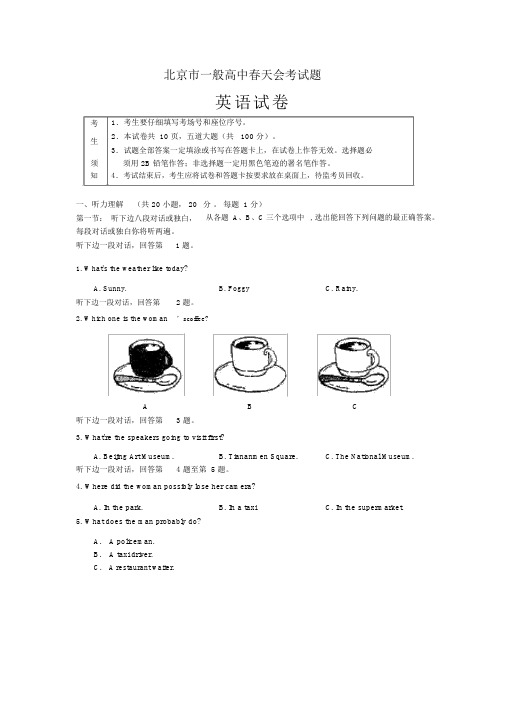
北京市一般高中春天会考试题英语试卷考1.考生要仔细填写考场号和座位序号。
生2.本试卷共 10 页,五道大题(共 100 分)。
3.试题全部答案一定填涂或书写在答题卡上,在试卷上作答无效。
选择题必须须用 2B 铅笔作答;非选择题一定用黑色笔迹的署名笔作答。
知4.考试结束后,考生应将试卷和答题卡按要求放在桌面上,待监考员回收。
一、听力理解(共 20 小题, 20 第一节:听下边八段对话或独白,每段对话或独白你将听两遍。
听下边一段对话,回答第 1 题。
分。
每题 1 分)从各题 A、B、C 三个选项中, 选出能回答下列问题的最正确答案。
1. What's the weather like today?A. Sunny.B. FoggyC. Rainy.听下边一段对话,回答第 2 题。
2. Which one is the woman ’scoffee?A B C听下边一段对话,回答第 3 题。
3. What're the speakers going to visit first?A. Beijing Art Museum.B. Tiananmen Square.C. The National Museum. 听下边一段对话,回答第 4 题至第 5 题。
4. Where did the woman possibly lose her camera?A. In the park.B. In a taxiC. In the supermarket.5. What does the man probably do?A. A policeman.B. A taxi driver.C. A restaurant waiter.听下边一段对话,回答第 6 题至第 7 题。
6.What's the woman's problem?A.She is out of a jobB.She is overworkedC.She has no working experience7.What's the man's suggestion?A.Doing some joggingB.Doing more teamwork.C.Taking training courses.听下边一段对话,回答第8 题至第 10 题。
2010年北京市高级中等学校招生考试英语试卷及答案

2010年北京市高级中等学校招生考试英语试卷二、听对话或独白,根据对话或独白的内容,从下面各题所给的A、B、C三个选项中选择最佳选项。
每段对话或独白读两遍。
(共12分,每小题1分)请听一段独白,完成第5至第6小题。
5. How’s Kate feeling now?A. Much better.B. Still sick.C. Even worse.6. Which page will Kate read?A. Page 15.B. Page 20.C. Page 25.请听一段独白,完成第7至第8小题。
7. Where’re the speakers?A. In a school.B. In a hospital.C. In a shop.8. What does the woman’s son like?A. Books.B. Music.C. Clothes.请听一段独白,完成第9至第10小题。
9. Who wants to be a doctor?A. Tom.B. Lisa.C. Sam.10. What’re the speakers mainly talking about?A. Their jobs.B. Their families.C. Their friends.请听一段独白,完成第11至第13小题。
11. What did the teacher do after Tim made trouble?A. They always punished him.B. They talked to his parents.C. They often laughed at him.12. Why did Tim lie down with his bike on top of him?A. To get a new bike.B. To make his mother angry.C. To play a joke on his mother.13. What’s the conversation mainly about?A. Tim’s behavior as a little boy.B. Tim’s feeling for his school life.C. Tim’s attitude toward his mother.请听一段独白,完成第14至第16小题。
2010年北京市春季普通高中会考英语试卷及答案
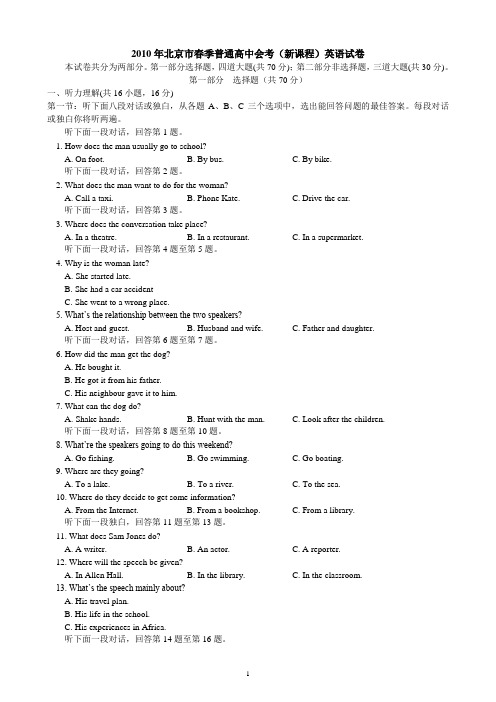
2010年北京市春季普通高中会考(新课程)英语试卷本试卷共分为两部分。
第一部分选择题,四道大题(共70分);第二部分非选择题,三道大题(共30分)。
第一部分选择题(共70分)一、听力理解(共16小题,16分)第一节:听下面八段对话或独白,从各题A、B、C三个选项中,选出能回答问题的最佳答案。
每段对话或独白你将听两遍。
听下面一段对话,回答第1题。
1. How does the man usually go to school?A. On foot.B. By bus.C. By bike.听下面一段对话,回答第2题。
2. What does the man want to do for the woman?A. Call a taxi.B. Phone Kate.C. Drive the car.听下面一段对话,回答第3题。
3. Where does the conversation take place?A. In a theatre.B. In a restaurant.C. In a supermarket.听下面一段对话,回答第4题至第5题。
4. Why is the woman late?A. She started late.B. She had a car accidentC. She went to a wrong place.5. What’s the relationship between the two speakers?A. Host and guest.B. Husband and wife.C. Father and daughter.听下面一段对话,回答第6题至第7题。
6. How did the man get the dog?A. He bought it.B. He got it from his father.C. His neighbour gave it to him.7. What can the dog do?A. Shake hands.B. Hunt with the man.C. Look after the children.听下面一段对话,回答第8题至第10题。
2010年北京市中考英语真题试题(含答案)
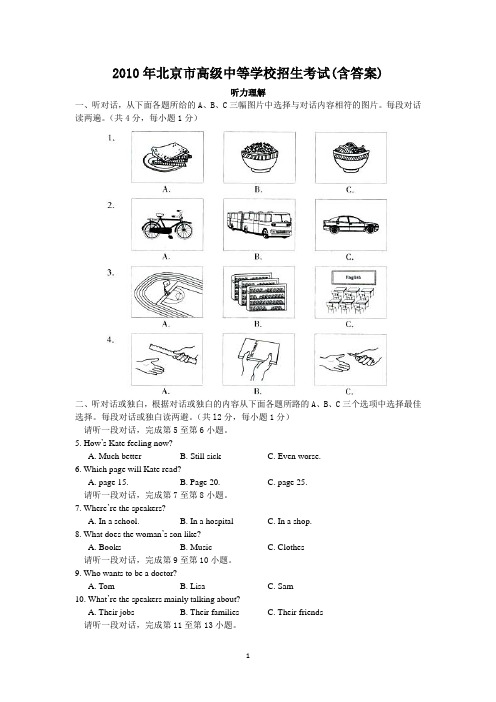
2010年北京市高级中等学校招生考试(含答案)听力理解一、听对话,从下面各题所给的A、B、C三幅图片中选择与对话内容相符的图片。
每段对话读两遍。
(共4分,每小题1分)二、听对话或独白,根据对话或独白的内容从下面各题所路的A、B、C三个选项中选择最佳选择。
每段对话或独白读两避。
(共l2分,每小题1分)请听一段对话,完成第5至第6小题。
5. How’s Kate feeling now?A. Much betterB. Still sickC. Even worse.6. Which page will Kate read?A. page 15.B. Page 20.C. page 25.请听一段对话,完成第7至第8小题。
7. Where’re the speakers?A. In a school.B. In a hospitalC. In a shop.8. What does the woman’s son like?A. BooksB. MusicC. Clothes请听一段对话,完成第9至第10小题。
9. Who wants to be a doctor?A. TomB. LisaC. Sam10. What’re the speakers mainly talking about?A. Their jobsB. Their familiesC. Their friends请听一段对话,完成第11至第13小题。
11. What did the teachers do after Tim made trouble?A. They always punished himB. They talked to his parentsC. They often laughed at him12. Why did Tim lie down with his bike on top of him?A. To get a new bikeB. To make his mother angryC. To play a joke on his mother13. What’s the conversant mainly about?A. Tim’s behavior as a little boy.B. Tim’s feeling for his school lifeC. Tim’s attitude toward his mother请听一段对话,完成第14至第16小题。
最新北京市高中会考-2010英语试题及答案1

北京市高中会考2006-2010英语试题及答案1精品好文档,推荐学习交流北京市2006年春季普通高中毕业会考英语试卷第一部分(选择题共70分)一、听力理解(共15小题,15分)第一节:听下面七段对话或独白,从各题A、B、C三个选项中, 选出能回答问题的最佳答案。
每段对话或独白你将听两遍。
听下面一段对话,回答第1题。
1. Where are the two speakers?A. In a hotel.B. In a market.C. In a restaurant.听下面一段对话,回答第2题。
2. What will the man probably do tonight?A. Sleep at home.B. Go to the movie.C. Study for the exam.听下面一段对话,回答第3题。
3. How long will it take the woman to get to Boston by train?A. 3 hours.B. 4 hours.C. 6 hours.听下面一段对话,回答第4题至第6题。
4. How much does an air ticket cost in June?A. $525.B. $480.C. $460.5. In which month is the air ticket the most expensive?仅供学习与交流,如有侵权请联系网站删除谢谢157精品好文档,推荐学习交流A. May.B. June.C. July.6. What can you learn from the conversation?A. Fewer people go to Madrid in July.B. The two speakers are going to Spain together.C. The woman hasn’t decided whether to go to Madrid.听下面一段对话,回答第7题至第9题。
普通高中英语会考试卷及答案

普通高中英语会考试卷及答案为了帮助学生备考普通高中英语会考,我们准备了以下的试卷及答案供参考。
第一部分:听力理解(共30分)第一节(共5小题,每小题1分,满分5分)听下面5段对话。
每段对话后有一个小题,从题中所给的A、B、C三个选项中选出最佳选项,并标在试卷的相应位置。
听完每段对话后,你都有10秒钟的时间来回答有关小题和阅读下一小题。
每段对话仅读一遍。
1. What does the man want to do?A. Go to the library.B. Buy a magazine.C. Borrow a book.2. What will the weather be like tomorrow?A. Cloudy.B. Sunny.C. Rainy.3. How does the woman feel now?A. Excited.B. Tired.C. Nervous.4. What does the man suggest the woman do?A. Take a taxi.B. Walk to the cinema.C. Call a friend for a ride.5. How much does the man want to sell his laptop for?A. $500.B. $600.C. $700.第二节(共10小题,每小题2分,满分20分)听下面4段对话和一篇短文。
每段对话或短文后有几个小题,从题中所给的A、B、C三个选项中选出最佳选项,并标在试卷的相应位置。
听每段对话或短文前,你将有时间阅读各个小题,每小题5秒钟;听完后,各小题将给出5秒钟的作答时间。
每段对话或短文读两遍。
听下面一段对话,回答第6和第7两个小题。
M: Do you have any plans for the weekend, Lucy?W: Yes, I am thinking about going to the music concert on Saturday evening. Would you like to join me?M: That sounds great!6. What does Lucy want to do on the weekend?A. Go to a concert.B. Visit the art museum.C. Watch a movie.7. What is the man's response?A. He is not sure.B. He doesn't want to go.C. He would like to go.听下面一段对话,回答第8和第9两个小题。
2010年北京市中考英语真题真题卷(含答案)

2010年北京市高级中等学校招生考试【精品】听力理解一、听对话,从下面各题所给的A、B、C三幅图片中选择与对话内容相符的图片。
每段对话读两遍。
(共4分,每小题1分)二、听对话或独白,根据对话或独白的内容从下面各题所路的A、B、C三个选项中选择最佳选择。
每段对话或独白读两避。
(共l2分,每小题1分)请听一段对话,完成第5至第6小题。
5. How’s Kate feeling now?A. Much betterB. Still sickC. Even worse.6. Which page will Kate read?A. page 15.B. Page 20.C. page 25.请听一段对话,完成第7至第8小题。
7. Where’re the speakers?A. In a school.B. In a hospitalC. In a shop.8. What does the woman’s son like?A. BooksB. MusicC. Clothes请听一段对话,完成第9至第10小题。
9. Who wants to be a doctor?A. TomB. LisaC. Sam10. What’re the speakers mainly talking about?A. Their jobsB. Their familiesC. Their friends请听一段对话,完成第11至第13小题。
11. What did the teachers do after Tim made trouble?A. They always punished himB. They talked to his parentsC. They often laughed at him12. Why did Tim lie down with his bike on top of him?A. To get a new bikeB. To make his mother angryC. To play a joke on his mother13. What’s the conversant mainly about?A. Tim’s behavior as a little boy.B. Tim’s feeling for his school lifeC. Tim’s attitude toward his mother请听一段对话,完成第14至第16小题。
(完整word)2010年高考试题(北京卷)英语试卷及答案解析,推荐文档

2010年普通高等学校招生全国统一考试英语(北京卷)本试卷共15页,共150分。
考试时长120分钟。
考生务必将答案答在答题卡上,在试卷上作答无效。
考试结束后,将本试卷和答题卡一并交回。
第一部分:听力理解(共三节,30分)第一节(共5小题;每小题1.5分,共7.5分)听下面5段对话。
每段对话后有一道小题,从每题所给的A、B、C三个选项中选出最佳选项。
听完每段对话后,你将有10秒钟的时间来回答有关小题和阅读下一小题。
每段对话你将听一遍。
1. What does the man want to be in the future?A. A soldier.B. A lawyer.C. A teacher.2. What does the girl want?A. Sweets.B. Books.C. Pencils.3. When did the two speakers plan to meet Jane?A. At2:00.B. At2:15.C. At2:30.4. what will the woman do tonight?A. Go to the park.B. Play basketball.C. Work at a bookstore.5. what is the woman doing?A. Offering help.B. Asking for information.C. Making an introduction.第二节(共10小题;每小题1.5分,共15分)听下面4段对话或独白。
每段对话或独白后有几道小题,从每题所给的A、B、C三个选项中选出最佳选项。
听每段对话或独白前,你将有5秒钟的时间阅读每小题。
听完后,每小题将给出5秒钟的作答时间。
每段对话或独白你将听两遍。
听第6段材料,回答第6至7题。
6. Where do the two speakers work?A. At a store.B. At a hotel.C. At a school.7. Where does the woman come from?A. Brazil.B. Australia.C. Singapore.听第7段材料,回答第8至9题。
2010年北京市中考英语试卷及答案

2010年北京市高级中等学校招生考试英 语 试 卷学校___________________ 姓名_______________ 准考证号___________________听力理解(略 共24分)知识运用(共27分)四、单项填空(共15分,每小题1分)从下列各题所给的A 、B 、C 、D 四个选项中,选择可以填入空白处的最佳选项。
21. Tom and Mike are good friends. _______ often help each others.A. TheyB. ThemC. TheirD. Theirs22. Some volunteers from Beijing arrived in Shanghai ________ April 29 to work forthe World Expo. A. on B. at C. of D. to 23. The reading room ________ very quiet. I enjoy reading books there.A. amB. isC. areD. be24. —________ schoolbag is this? —I guess it ’s Lily ’s.A. WhatB. WhoC. WhoseD. Which25. —Which color do you like ________, blue or green?—Blue.A. goodB. betterC. bestD. the best26. There is ________ wrong with this computer. It doesn ’t work well.考 生 须 知1、本试卷共12页,满分120分,考试时间120分钟。
2、 在试卷和答题卡上准确填写学校名称、姓名和准考证号。
3、 试题答案一律填涂或书写在答题卡上,在试卷上作答无效4、 在答题卡上,选择题用2B 铅笔作答,其他试题用黑色字迹签字笔作答。
北京历年春季英语会考真题

2012年北京市春季普通高中会考英语试题二、单项填空(共15小题,15分)从各题A、B、C、D四个选项中,选出可以填入空白处的最佳答案。
21. – What do you think of the two ties?--- Perfect. But I don’t know which is better, so I’ll take _____ of them.A. bothB. noneC. allD. neither22. I wrote a letter to the car rental agency, explaining _____ had happened.A. howB. whatC. whyD. that23. --- What bad weather!---- Yes. The radio says it will be even ______ later on.A. goodB. betterC. badD. worse24. People can find almost whatever they need at the new shopping mall, ______ is always busy at weekends.A. whichB. whereC. thatD. as25. ---- Do you like the scarf?--- Yes, it _____ very soft.A. smellsB. getsC. feelsD. becomes26. I really don’t like the weather in the north as it _____ be quite windy, especially in spring.A. mustB. canC. shouldD. shall27. John ______ in his room when he heard someone yelling and screaming.A. had studiedB. studiedC. was studyingD. would study28. ----Hello. Is Tom there?---- Hold on, please. I _____ if I can find him for you.A. would seeB. seeC. have seenD. will see29. ---- How about _______ Christmas party?---- I would say it was ______ success.A. the; aB. a; aC. a; 不填D. the ; 不填30. Peter was late for the business meeting because his flight _____ by a heavy storm.A. delaysB. delayedC. is delayedD. was delayed31. People say Vancouver is Canada’s most beautiful city, ______ by mountains and the Pacific Ocean.A. surroundedB. surroundingC. being surroundedD. to surround32. Native English speakers from different countries can understand each other ______ they don’t speak the same kind of English.A. so thatB. even ifC. in caseD. as though33. --- Can David take charge of the international department?---- I’m afraid it’s ______ his ability.A. underB. withinC. overD. beyond34. Don’t respond to any e-mails _____ personal information, no matter how official they look.A. requestedB. requestC. requestingD. to be requested35. ________ a world of fantasy about ancient England, come to Camelot Park!A. EnteringB. EnterC. To enterD. entered三、完形填空(共15小题,15分)阅读下面短文,从各题A、B、C、D四个选项中,选出可以填入空白处的最佳答案。
2010年高考试题(北京卷)英语试卷及答案解析
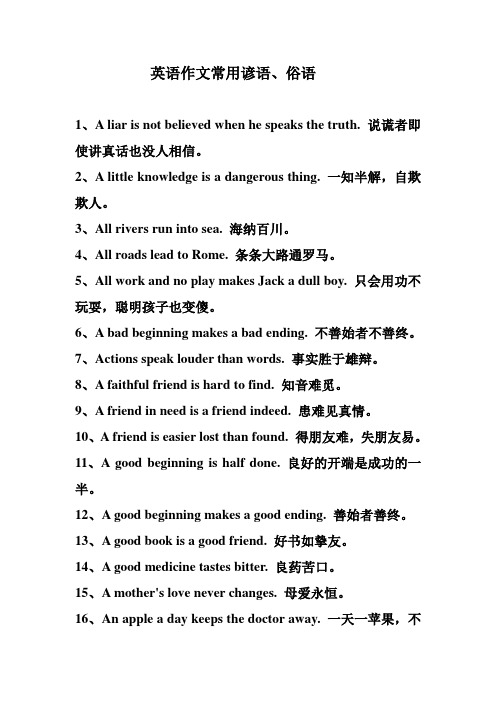
英语作文常用谚语、俗语1、A liar is not believed when he speaks the truth. 说谎者即使讲真话也没人相信。
2、A little knowledge is a dangerous thing. 一知半解,自欺欺人。
3、All rivers run into sea. 海纳百川。
4、All roads lead to Rome. 条条大路通罗马。
5、All work and no play makes Jack a dull boy. 只会用功不玩耍,聪明孩子也变傻。
6、A bad beginning makes a bad ending. 不善始者不善终。
7、Actions speak louder than words. 事实胜于雄辩。
8、A faithful friend is hard to find. 知音难觅。
9、A friend in need is a friend indeed. 患难见真情。
10、A friend is easier lost than found. 得朋友难,失朋友易。
11、A good beginning is half done. 良好的开端是成功的一半。
12、A good beginning makes a good ending. 善始者善终。
13、A good book is a good friend. 好书如挚友。
14、A good medicine tastes bitter. 良药苦口。
15、A mother's love never changes. 母爱永恒。
16、An apple a day keeps the doctor away. 一天一苹果,不用请医生。
17、A single flower does not make a spring. 一花独放不是春,百花齐放春满园。
18、A year's plan starts with spring. 一年之计在于春。
历年北京普通高中会考英语真题及答案
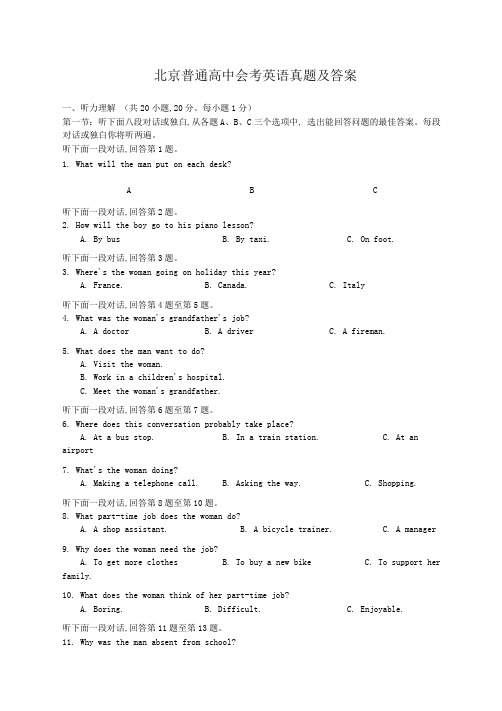
北京普通高中会考英语真题及答案一、听力理解(共20小题,20分。
每小题1分)第一节:听下面八段对话或独白,从各题A、B、C三个选项中, 选出能回答问题的最佳答案。
每段对话或独白你将听两遍。
听下面一段对话,回答第1题。
1. What will the man put on each desk?A B C听下面一段对话,回答第2题。
2. How will the boy go to his piano lesson?A. By busB. By taxi.C. On foot.听下面一段对话,回答第3题。
3. Where's the woman going on holiday this year?A. France.B. Canada.C. Italy听下面一段对话,回答第4题至第5题。
4. What was the woman's grandfather's job?A. A doctorB. A driverC. A fireman.5. What does the man want to do?A. Visit the woman.B. Work in a children's hospital.C. Meet the woman's grandfather.听下面一段对话,回答第6题至第7题。
6. Where does this conversation probably take place?A. At a bus stop.B. In a train station.C. At an airport7. What's the woman doing?A. Making a telephone call.B. Asking the way.C. Shopping.听下面一段对话,回答第8题至第10题。
8. What part-time job does the woman do?A. A shop assistant.B. A bicycle trainer.C. A manager9. Why does the woman need the job?A. To get more clothesB. To buy a new bikeC. To support her family.10. What does the woman think of her part-time job?A. Boring.B. Difficult.C. Enjoyable.听下面一段对话,回答第11题至第13题。
2010 年普通高等学校招生全国统一考试(北京卷)-答案
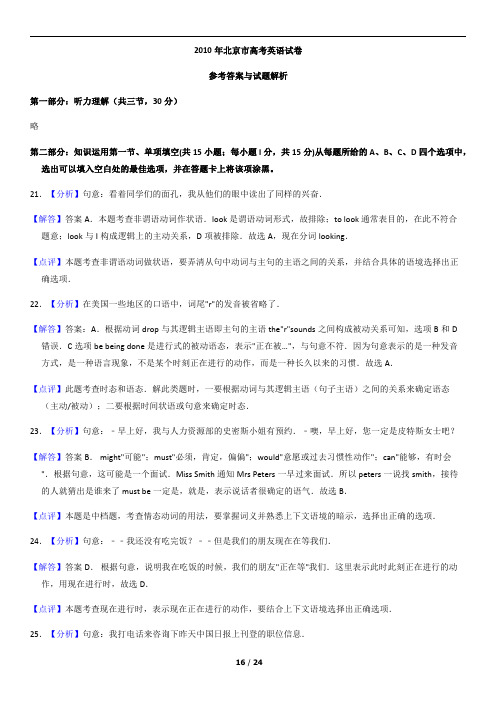
2010年北京市高考英语试卷参考答案与试题解析第一部分:听力理解(共三节,30分)略第二部分:知识运用第一节、单项填空(共15小题;每小题l分,共15分)从每题所给的A、B、C、D四个选项中,选出可以填入空白处的最佳选项,并在答题卡上将该项涂黑。
21.【分析】句意:看着同学们的面孔,我从他们的眼中读出了同样的兴奋.【解答】答案A.本题考查非谓语动词作状语.look是谓语动词形式,故排除;to look通常表目的,在此不符合题意;look与I构成逻辑上的主动关系,D项被排除.故选A,现在分词looking.【点评】本题考查非谓语动词做状语,要弄清从句中动词与主句的主语之间的关系,并结合具体的语境选择出正确选项.22.【分析】在美国一些地区的口语中,词尾"r"的发音被省略了.【解答】答案:A.根据动词drop与其逻辑主语即主句的主语the"r"sounds之间构成被动关系可知,选项B和D 错误.C选项be being done是进行式的被动语态,表示"正在被…",与句意不符.因为句意表示的是一种发音方式,是一种语言现象,不是某个时刻正在进行的动作,而是一种长久以来的习惯.故选A.【点评】此题考查时态和语态.解此类题时,一要根据动词与其逻辑主语(句子主语)之间的关系来确定语态(主动/被动);二要根据时间状语或句意来确定时态.23.【分析】句意:﹣早上好,我与人力资源部的史密斯小姐有预约.﹣噢,早上好,您一定是皮特斯女士吧?【解答】答案B.might"可能";must"必须,肯定,偏偏";would"意愿或过去习惯性动作";can"能够,有时会".根据句意,这可能是一个面试.Miss Smith通知Mrs Peters一早过来面试.所以peters一说找smith,接待的人就猜出是谁来了must be一定是,就是,表示说话者很确定的语气.故选B.【点评】本题是中档题,考查情态动词的用法,要掌握词义并熟悉上下文语境的暗示,选择出正确的选项.24.【分析】句意:﹣﹣我还没有吃完饭?﹣﹣但是我们的朋友现在在等我们.【解答】答案D.根据句意,说明我在吃饭的时候,我们的朋友"正在等"我们.这里表示此时此刻正在进行的动作,用现在进行时,故选D.【点评】本题考查现在进行时,表示现在正在进行的动作,要结合上下文语境选择出正确选项.25.【分析】句意:我打电话来咨询下昨天中国日报上刊登的职位信息.【解答】答案A.in yesterday's China Daily做后置定语修饰the position,advertise与the position之间是被动的关系.故用过去分词短语做后置定语.故选:A.【点评】本题考查过去分词短语做后置定语.26.【分析】﹣﹣不好意思,我没听懂你说的话.你刚才是说你想要9月20号回来吗?﹣﹣对不起,我没能表达清楚.我们想要10月20号回来.【解答】答案D.本题考查时态.根据句意可知,说话者的意思是"我没能表达明白"导致你现在没听懂,这是过去的动作对现在造成的影响或结果,因而应该用现在完成时.A选项用过去完成时,而过去完成时是在过去某个动作之前的动作,显然在本句中没有形成先后动作的时间对比.故选D.【点评】时态题的考查关键是抓住句子的上下文含义和句中的时间状语.要根据时间状语来选择合适的时态,在平时的学习中要注意积累有关时态的用法和各种时态的特殊之处.27.【分析】句意为:那些不怎么活跃的孩子,或者(那些)饮食很油腻的,胖得很快.【解答】答案:B,句中含有两个定语从句,who are not active or____diet is high in fat两个定语从句通过连词or并列,他们的饮食,就只能用whose.句中两个定语从句修饰chilren,所以本题选择B.【点评】whose意思是谁的,定语从句里面不光指人,像"房子的,车子的,包包的"都可以,比如,The newly built café,the walls of_______are painted light green,is really a peaceful place for us,specially after hard work.28.【分析】句意:我花费了很长时间才完全领会他们为我所做的.【解答】答案A.句中was able to表示发生在过去的时间,而根据句意他们为我所做的,应该已经做完了,发生在took这个动作之前,即过去的过去,故选A【点评】本题是基础题,考查过去完成时,时态的题目很多要通过上下文的判断得知.过去完成时表示动作发生在过去的过去.29.【分析】你能不能不要摘花园里的花?这些花是给所有人欣赏的.【解答】答案:C,for表示"为了",即这些花是给所有人欣赏的.to everyone's enjoyment对于每个人的快乐来说.一般只能做状语,意思是"让大家开心的是",类似于to one's surprise,for one's surprise是指"为了每个人的快乐",表示目的.所以本题选择for.【点评】考查介词时主要看介词和名词之间的搭配,或是动词、形容词和介词之间的搭配,在理解句意的基础之上,选用适当介词.30.【分析】句意:一旦学生们决定了要上哪所大学,他们应该研究申请此大学的入学申请程序.【解答】答案D.as"因为,随着,虽然,当…时候,作为,按照";while"虽然,当…时候";until"直到…";once"一旦".根据句意,本题需要一个条件状语从句,"一旦决定…",故选D.【点评】本题是中档题,考查从属连词的使用,要熟悉从属连词的具体用法并结合语境,选择出正确选项.31.【分析】句意为:我想要因我的内在而被喜欢,被爱.【解答】答案:C,这一道题必须从语义上去选择答案,这里强调的是我想被人喜欢,而喜欢我的人是喜欢我内在,而不是我的外在的东西,更不是我这个人,for是介词,所以后面的句子是宾语从句,宾语从句中缺少表语,所以需要用连接代词,排除B和D.如果用who表达不出,我渴望被理解,渴望被爱的感觉,who I am inside指我内心里是谁,我从心里看是谁,表达的是一种疑问,对自身的怀疑,what I am inside我的内在是什么我具有什么,更贴近句子的意思.【点评】本句容易误选who.当从句中缺少主语或宾语、表语时,指人一般用who/whom,但如果表示人的内在所具有的品质时,一般用what,比如:My mother made me what I am today.(我妈妈造就了今天的我).32.【分析】句意:查尔斯.狄更斯更喜欢自己的小说≤大卫.科波菲尔≥的部分原因是这本书是以他的真实生活为原型创造的.【解答】答案B.__it was rather closely modeled on his own life是表语从句,这里缺少一个引导词,而在表语从句中,句子结构完整,意义表达清晰,并且不缺少任何成分.故用连接词that,选B.【点评】本题考查表语从句中引导词的用法,要分析句子结构是否完整并结合具体的语境选择出正确选择.33.【分析】句意为:被一些人认为是缺点的东西却被其他很多人认为是优点.【解答】答案:B,本句中含有主语从句,what some people regard as a drawback是主语从句,从句中,regard缺少宾语,Whether和that在从句中不充当任何成分,how充当状语,所以可以排除其他选项.regard…as和see…as都是把.看作.【点评】本句考查主语从句的连接代词.句中is是系动词,也是判断一些主语从句的关键,is之前的是主语,is 后面的是表语从句,构成主系表结构.然后再根据从句中的具体情况作出正确选择.34.【分析】句意为:﹣﹣天气太热太干燥.﹣﹣对.要是当时下一滴雨,情况现在就好多了,我的蔬菜当时就不会死了.【解答】答案:D这里things would be much better now,说明与现在情况相反的虚拟语气,句中有now,所以不能用things would have been much better表示与过去事实相反的虚拟语气,后半句中表示的事实是"我的蔬菜死了"这应该是过去的事情,所以后面用D.【点评】本题考查混合式虚拟语气,前半句是对现在的情况的虚拟,而后半句是对过去的事情的虚拟,这一点需要看清.35.【分析】句意:第一印象是最持久的.毕竟,你永远不可能有第二次机会去再给别人留一次第一印象.【解答】答案:C.根据句意"你永远不可能有第二次机会去再给别人留一次第一印象."可知,这里"___a second chance"是指又一次机会,后面"make__first impression"是指再留一次第一印象,而序数词前面加不定冠词,意为"又一,再一",故a符合语境,所以选C.【点评】本题考查冠词的用法.冠词主要分为不定冠词(a/an泛指)、定冠词(the特指)和零冠词.要掌握各个冠词的主要用法,再结合语境作答.还要注意冠词在一些固定短语的使用.第二节、完形填空(共1小题;每小题l.5分,共30分)阅读下面短文,掌握其大意,从每题所给的A、B、C、D四个选项中,选出最佳选项,并在答题卡上将该项涂黑.【分析】本文是一篇记叙文.通过加入舞台设计小组和遇到Mrs.Neidl对作者的影响,作者彻底改变了自己,发现了自己的兴趣和价值,并且变得更加自信和坚强.【解答】36.B考查连词辨析.根据前面unpleasant voice和direct way of speaking是消极意向,后面encouraging 和inspiring是积极意向,因此需填转折连词,四个选项中A表并列,C表结果,D表原因,只有B选项yet表转折.故选B.37.A考查名词辨析.根据第二段第二句话"她想知道我认为我们该怎样处理事情"直接提示了这个空应该选观点opinion这个词.第二段倒数第四句话中也出现了这个词从而验证了其正确性.故选A.38.C考查动词辨析.根据后面发生的一系列事情可以看出作者在这个活动中要处理很多的事情.故选C.39.D考查代词辨析.根据句子前半句中的"had no idea"可知,开始我不知如何回答是因为我对舞台设计"一无所知"."know nothing about sth"意为"对某事一无所知".故选D.40.A考查名词辨析.根据第二段第一句中的"ask提问"及第四句中的"answer回答"可知,这里应填"question问题"这个词,respond toher questions.故选A.41.D考查动词辨析.根据文意推断,作者开始并没有观点,由于她相信我有观点所以我形成了观点.故选D.42.C考查形容词辨析.解题线索在后半句"so I began to show up to paint more and more"作者做的事情变多是Mrs.Neidl信任的结果,说明我是个可信赖(reliable)的人,C选项符合题意.其他三个选项happy高兴的lively活泼的和punctual准时的都不能表达出这种合理的因果关系.另外迷惑性较大的lively通常用来形容物.故选C.43.B考查名词辨析.根据引号里是一句鼓励性质的话,而且前面"that year"也是线索,说明这话是她的motto座右铭.迷惑性较大的C选项saying是谚语的意思,往往是人们长期形成的对生活及经验的总结,强调群体性及时间性,故不合适,message信息,suggestion建议,不合题意.故选B.44.D考查副词辨析.本题难度较大,解题关键词是介词"over",表覆盖.选择later可以理解为"如果没有画好,稍后可以再画一次覆盖在之前的画上."more更多,Instead代替,不合题意.迷惑性最大的是again.表示"再一次、又一次",但是放在这里与over意思重复,paint overit later相当于paint it again,.故选D.45.D考查名词辨析.take risks固定搭配,冒险.通读全文发现作者是开始很不自信,第四段开头也提示了作者"shy","quiet",因此动笔画画对他来说是个冒险,是自我突破的过程,文章最后一段也提到了take chances冒险.故选D.46.A考查动词辨析.improve upon改进.根据本段开头的座右铭"试试吧,我们永远可以重画一次."可知,不存在失败,只存在改进.act upon按照、对…起作用;look upon看待,考虑;reflectupon考虑,回顾;均不符题意.故选A.47.C考查副词辨析.本段主要描写了作者从不敢做到敢做的过程,根据前文提示可知,作者曾很不自信,后来在Mrs.Neidl的鼓励下自信地拿起了画笔.故选C.48.B考查动词辨析.根据语境可知,因为我在这个项目中付出的时间和努力,我开始被认可.be recognized as"被公认为、被承认";be introduced"被介绍、引入";be identified as"被确定是",有验证身份的意思;be considered as"被认为、被当作".其中be recognized as有"被大家承认、被普遍接受"的意思,表意更准确.故选B.49.C考查动词辨析.解题关键词是"want".作者意识到自己想要的是什么,所以用realized.迷惑项是decided 决定.可以说决定要什么,但不可以说决定想什么,因为想法是不可控制的.故选C.50.A考查介词辨析.根据语境可知,与Mrs.Neidl在舞台设计小组的这段时间令我彻底改变了.故选A.51.B考查动词辨析.根据句意"我发现了一种很强烈的愿望和一个我原来都不知道存在的世界,可以判断原来不知道存在,现在"发现了"更为贴切.故选B.52.B考查动词辨析.根据语境可知,"她教会我不要去在乎别人认为我该怎么做",care在乎,符合文意.accept 接受,judge判断,wonder怀疑均不合文意.故选B.53.D考查形容词辨析.根据前面说take chance冒险,后面理所当然说不要怕(失败),而且前文反复出现了afraid这个词,是全篇的关键词.bored无聊的,lazy懒惰的,sad伤心的,在文中均无体现.故选D.54.A考查名词辨析.通读全文会发现文中多次提到Mrs.Neidl对作者的信任,并在第三段明确使用了trust这个词,因此推断出答案.故选A.55.C考查形容词辨析.根据语境可知,"她对我的信任激励我完成以前认为不可能的事情","never imagined possible"等于"imagined impossible."认为不可能的,贴合文意.故选C.【点评】解答此类题目可遵循以下步骤:第一步,通读全文,了解文章大意,获得整体印象,同时初选出一批较有把握的答案.第二步,边核对初选答案边补填留下的空格.如果短文难度较大,则可复读几遍,核对和确定答案.有些空一时决定不了,可作个记号,待复查时再确定.第三步,复查定稿.从整体理解角度出发,仔细审核答案,确保意义上、语法上没有错误,同时对遗留下来的少数几个空格作最后选择.第三部分、阅读理解(共两节,40分)阅读下列短文,从每题所给的A、B、C、D四个选项中,选出最佳选项,并在答题卡上将该项涂黑.【分析】本文是一篇记叙文,记叙了作者在她家门口有一条狗,起名为戈尔迪,刚开始这只狗在她家很不安,但是几周后戈尔迪平静下来,当作者和戈尔迪一起散步的时候,戈尔迪跑回以前的家(农场).【解答】56.答案:B.细节理解题.由原文第2段She hardly ate anything and had such an air of sadness about her.There was nothing I could do to make her happy,it seemed.Heaven knows what had happened to her at her previous owner's.划线句子表明作者同情被遗弃的小狗,希望帮助它高兴起来.57.答案:A.细节理解题.由第二段第二行"She was so unsettled during those first few days.She hardly ate anything and had such an air of sadness about her."可知在最初几天里,她是如此的不安.她几乎没有吃任何东西,所以选A.58.答案:D.细节理解题.由倒数第三段最后一句"Eventually I couldn't hold her any longer and she raced off down the road towards a farmhouse in the distance as fast as she could."最后我抱不住她了,于是她冲到地上,尽快地跑向远处的一个农舍.可知她找到了自己熟悉的地方,所以选D59.答案:A.推理判断题.由第一段作者先发现狗、第二段第二行"She was so unsettled during those first few days、第五行But eventually at the end of the first week she calmed down."可以推出答案,所以选A【点评】做此类阅读时要学会从事情本身的发展去理解故事情节而不要只看事件在文中出现的先后顺序;注意作者的议论和抒情;把握作者态度;有章有据进行解题判断.【分析】本文是一封来自编辑写给编辑的信.信中讲述了一位记者希望编辑能够激发他的潜力,而作者也受之启发,规劝编辑们应该注重记者们的发展.【解答】60.答案C.细节理解题.根据文章"He talked to me because he wants his editors to demand so much more of him.He wants to be pushed,challenged,coached to new heights"可知,作者描述的记者想挑战自己,以达到一个更高的高度."Optimistic"乐观的."Imaginative"富有想象力的."Ambitious"有雄心抱负的."Proud."自豪的.故选C.61.答案D.细节理解题,根据文章"He longs for conversations with an editor who will help him turn his good ideas into grea t ones"可知,记者希望编辑能够帮助他将他的想法变得更好,即改进他的想法.故选D.62.答案A.推理预测题.根据文章"Open Letter to an Editor"可知,这封信是写给编辑的,通读全文,记者向作者聊天,而作者又在结尾规劝编辑,则可推测写这篇文章,知道记者的想法的作者,也是编辑.故选A.63..答案C.细节理解题.根据文章"Our best hope in keeping our best reporters,copy editors,photographers,artists﹣﹣﹣everyone﹣﹣is to work harder to make sure they get the help they are demanding to reach their potential"可知,这封信是希望编辑能注重发展记者们的潜力.故选C.【点评】本文考查政治经济类文章的阅读水平,学生需要认真阅读原文,把握文章大意,对文章脉络有整体的了解,能仔细查找文中细节,并能根据文章内容进行合理的推测判断【分析】本文是一篇说明文,主要阐述是有关语速和停顿的相关信息.交谈是一种轮回转换的游戏,不同文化的人说话的节奏和方式都是不一样的.说话语速和停顿是一个谈话的技巧,是人们谈话的个性和能力.习惯上的不同常常建立在危险的思维定式上,一些社会现象可能导致严重的个人后果.【解答】64.C推理判断题.根据文章第3段2,3行"Betty often felt interrupted by Sara.But Betty herself became an interrupter and found herself doing most of the talking when she met a visitor from Finland.And Sara had a hard time cutting in on some speakers from Latin America or Israel."可知,Sara发现自己很难插话,是因为Betty没有按照说话的轮次来.导致两个人说话总是被打断.故C正确.65.B推理判断题.根据文章第三段最后一句"Sara had a hard time cutting in on some speakers from Latin America or Israel."可知,美国人或者以色列人说话的停顿很短,Sara很难插话.以色列人说话的节奏和美国人说话的节奏是类似的,所以把这两者放在一起进行比较.故B正确.66.C推理判断题.根据文章第4段前3行"The general phenomenon,then,is that the small conversation techniques,like pacing and pausing,lead people to draw conclusions not about conversational style but about personality and abilities.These habitual differences are often the basis for dangerous stereotyping(思维定式).And these social phenomena can have very personal consequences."可知一个人讲话的能力是受到他所在的文化和思维方式影响的.故C正确.67.D细节理解题.根据文章第五段"When she was evaluated at the end of the year,she was told to take a training course because of her inability to speak up"可知,她会在那个自信养成培训课程上被登记成什么样.故选D.【点评】解答细节理解题时,一个常用的方法就是运用定位法,即根据题干和选项中的关键词从原文中找到相关的句子,与选项进行比较从而确定答案;推理判断题既要求学生透过文章表面文字信息推测文章隐含意思,又要求学生对作者的态度、意图及文章细节的发展作正确的推理判断,力求从作者的角度去考虑,不要固守自己的看法或观点.【分析】本文是说明文,主要讲述的是高等教育成本,个人必须为其接受的高等教育付费,大学毕业生收入比非大学毕业生高.同时,社会流动更依赖于学历.然而只有一些人拥有学历.因此并非纳税人,而是个人必须为此付费.有保障的薪酬是辛勤工作的宿敌,当教师变得懒惰与无能,学生也会同样懒惰.如果学生必须为其所受教育付费,他们不仅会更加努力地学习,还会希望从老师那里获取更多.而且他们的老师必须使他们满意.那意味着认真治学,且没有太多时间让他们从事为自己的利益进行的研究.【解答】68.B词意猜测题.根据本句中"There are pressing calls on the resources(资源)of the government.Using taxpayers'money to help a small number of people to earn high incomes in the future is not one of them."可知,很多地方迫切需要政府资源.用纳税人的钱来帮助少数人在未来获取高收入并非其中(迫切需要的政府资源)之一.故选B.69.D细节理解题.根据题干关键词"full government funding"定位原文,根据第二段"Full government funding(资助)is not very good for universities….and when the academics were lazy and incompetent,the students were similarly lazy.""lazy"转换成"spend less time"故选D.70.A推理判断题.根据第四段"Many people believe that higher education should be free…"可知,作者用来支持支持自己的论点(个人必须为其接受的高等教育付费),也就是要反对free higher education.【点评】解答细节理解题时,一个常用的方法就是运用定位法,即根据题干和选项中的关键词从原文中找到相关的句子,与选项进行比较从而确定答案;推理判断题既要求学生透过文章表面文字信息推测文章隐含意思,又要求学生对作者的态度、意图及文章细节的发展作正确的推理判断,力求从作者的角度去考虑,不要固守自己的看法或观点.第二节根据短文内容,从短文后的七个选项中选出能填入空白处的最佳选项.选项中有两项为多余选项.【分析】本文是一篇选句填空阅读,下次你进入银行,商店或者超市,停下来听一听,你听到了什么?在商店里播放的那些背景音乐与日常音乐很相似,但是能让人轻松,因为这种音乐尤其旨在让你放松,或给你额外能量,有时你甚至没有意识到音乐响起,但无论如何音乐对你起了作用.本文以此展开,讲述了助兴音乐.【解答】71.C.联系下文题.根据下一句"It's similar to the music you listen to,but it's not exactly the same"可知,在商店里播放的那些背景音乐与日常音乐很相似,但是能让人轻松.故选C.72.B.段落理解题.根据本段内容可知,本段讲述的是这些音乐的作用,能让人放松,能给人特别的能量(The music gives them extra energy).故选B.73.F.语境辨析题.本句句意为"很多音乐家喜欢他们的音乐会被Muzak所使用,因为他们可以从中挣很多的钱",根据"Some musicians or songwriters don't want their songs to be used as Muzak,but others are happy when their songs are chosen.Why?"可知,一些音乐家或者词曲作者不希望他们的歌曲作为助兴音乐,但其他人很高兴当他们的歌曲被选择,为什么?故F项:They get as much as$4million a year if their songs are used.如果他们的歌曲被使用,每年他们会获得400万美元,符合语境.故选F.74.D.段落理解题.本句句意为"工厂工人生产多出13%"本段Tired office workers suddenly have more energy when they hear the pleasant sound of Muzak in the background提及这样的音乐能让那些疲惫的人提高生产效率,购物者多买东西.故C项内容与段落大意相符.故选D.75.A.联系上文题.根据But other people enjoy hearing Muzak in public places.但是其他人喜欢在公共场所听这种音乐.可知,一些人不喜欢这样的音乐.符合语境,故选A.【点评】本文是一篇选句填空阅读,主要考查学生对文章内容理解及上下文联系,做题时,应仔细阅读原文,对照原文内容结合所给选项含义,联系上下文,从而得出正确答案.切忌胡乱猜测,一定要做到有理有据.第四部分:书面表达第一节情景作文【分析】本文是图画类作文,要求根据四幅图的先后顺序,叙述帮助祖父母去北戴河的旅行从准备到送行的全过程.又是一种情景作文.在写作时,描述图片应以第一人称和过去时态为主.根据情景的发展,抓住细节按顺序安排好材料.重要短语:the trip to sp….(去…的旅行),….together with….(和…一起),searched sth for…(寻找…),manage to do(成功做某事),buy sth for sb(买某物给某人),see sb off(为某人送行…),wave goodbye to sb(向某人挥手告别),wish sb sth(祝愿某人…).【解答】Last weekend,I helped my grandparents prepare their trip to Beidaihe.On Saturday morning,together with my grandparents,I searched the Internet for the train schedule,the weather in Beidaihe,and some hotelinformation.(上网查询时刻表、关注天气、宾馆信息)【高分句型】In the afternoon,I went to the train station and managed to buy two tickets for my grandparents although there was a long queue.(车站买票)After dinner,I packed into the suitcase the things my grandparents need,such as clothes,glasses,an umbrella,and a map.(打包准备行李)The next morning,I went to the station to see them off.Waving goodbye to them on the platform,I felt happy for them and wished them a safe journey.【高分句型】(送行)【点评】看图作文要求将画面所包含的有效信息用文字表达出来,并适当拓展并发挥想象.如果是记叙文类的素材,要注意故事的时间、地点、人物、事件的起因、过程、结果这六个要素;如果是说明文或议论文,首先要对图画的内容进行描述,然后围绕图画的信息进行说明或议论.写作时注意准确运用时态,上下文意思连贯,尽量使用自己熟悉的单词句式,同时也要注意使用高级词汇和高级句型使文章显得更有档次.【分析】本文为看图作文,主题是"不管面对多大困难,始终要坚持不懈,百折不挠,成功定会到来".写作时可按"二段式"来写,首先描述图片点明主题,然后分析概述其含义,发表感想.基本时态为一般现在时,人称以第三人称为主.重要短语:struggle all the way(一路奋斗…..),remind sb of sth(提醒某人某物),give up(放弃),try one's best to do sth(努力做某事),succeed in sth(成功做某事),be faced with(面临,面对).【解答】In the picture,between two closely﹣located buildings grows a big tree.【高分句型】Unlike most trees,this one bends in the middle,struggling all the way up to get more sunshine.【高分句型】(描述图片)The picture reminds me of those who succeed in unfavorable conditions.【高分句型】Faced with difficulties,they never give up but try their best to find a way out.【高分句型】Life can be hard.But if we have the courage and determination,we will finally get the sunshine we want as the tree in the picture does.(理解图片)【点评】写作看图作文时,首先认真看图,结合图片和文字,确定所要表达的主题是什么,然后围绕主题,提炼要点,合理想象,对译出的要点通过合理的组合,加上必要的连接词使表达连贯.同时也要注意使用高级词汇和高级句型使文章显得更有档次,平时需注意积累短语和重要句型.。
往年北京普通高中会考英语真题及答案
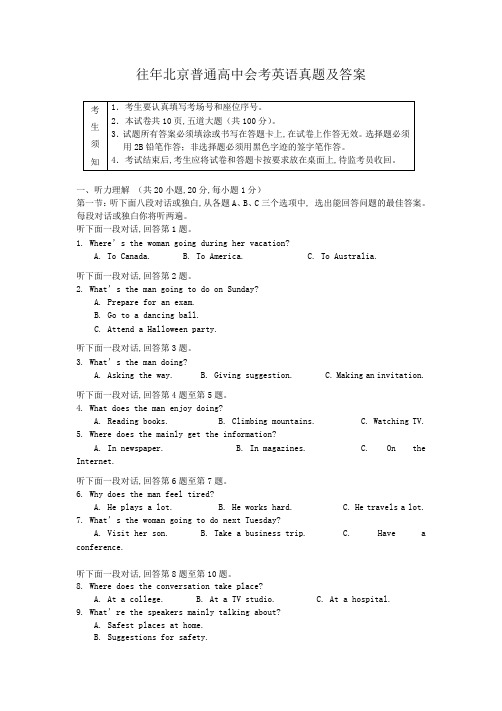
往年北京普通高中会考英语真题及答案一、听力理解(共20小题,20分,每小题1分)第一节:听下面八段对话或独白,从各题A、B、C三个选项中, 选出能回答问题的最佳答案。
每段对话或独白你将听两遍。
听下面一段对话,回答第1题。
1. Where’s the woman going during her vacation?A. To Canada.B. To America.C. To Australia.听下面一段对话,回答第2题。
2. What’s the man going to do on Sunday?A. Prepare for an exam.B. Go to a dancing ball.C. Attend a Halloween party.听下面一段对话,回答第3题。
3. What’s the man doing?A. Asking the way.B. Giving suggestion.C. Making an invitation.听下面一段对话,回答第4题至第5题。
4. What does the man enjoy doing?A. Reading books.B. Climbing mountains.C. Watching TV.5. Where does the mainly get the information?A. In newspaper.B. In magazines.C. On the Internet.听下面一段对话,回答第6题至第7题。
6. Why does the man feel tired?A. He plays a lot.B. He works hard.C. He travels a lot.7. What’s the woman going to do next Tuesday?A. Visit her son.B. Take a business trip.C. Have a conference.听下面一段对话,回答第8题至第10题。
北京市普通高中学业水平考试合格性考试英语试题 解析版
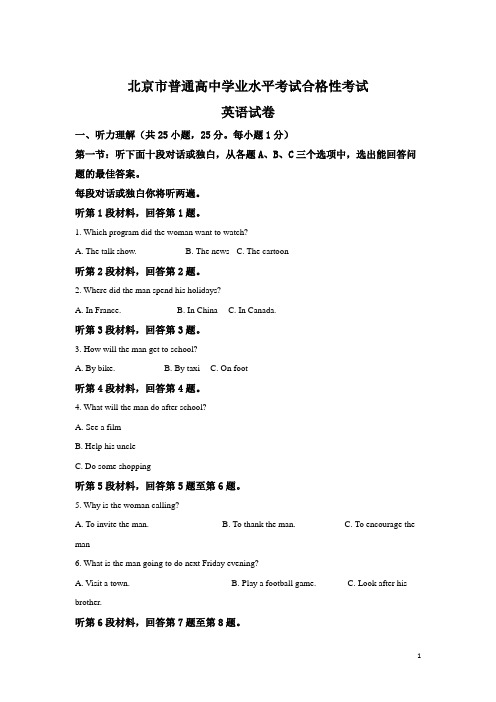
北京市普通高中学业水平考试合格性考试英语试卷一、听力理解(共25小题,25分。
每小题1分)第一节:听下面十段对话或独白,从各题A、B、C三个选项中,选出能回答问题的最佳答案。
每段对话或独白你将听两遍。
听第1段材料,回答第1题。
1. Which program did the woman want to watch?A. The talk show.B. The newsC. The cartoon听第2段材料,回答第2题。
2. Where did the man spend his holidays?A. In France.B. In ChinaC. In Canada.听第3段材料,回答第3题。
3. How will the man get to school?A. By bike.B. By taxiC. On foot听第4段材料,回答第4题。
4. What will the man do after school?A. See a filmB. Help his uncleC. Do some shopping听第5段材料,回答第5题至第6题。
5. Why is the woman calling?A. To invite the man.B. To thank the man.C. To encourage the man6. What is the man going to do next Friday evening?A. Visit a town.B. Play a football game.C. Look after his brother.听第6段材料,回答第7题至第8题。
7. What is the possible relationship between the two speakers?A. Husband and wife.B. Brother and sister.C. Teacher and student.8. Which camp do the speakers decide to choose?A. A drawing camp.B. A swimming camp.C. A cooking camp 听第7段材料,回答第9题至第11题。
2010年高考试题(北京卷)英语试卷及答案解析

2010年普通高等学校招生全国统一考试英语(北京卷)第二部分:知识运用(共两节,45分)第一节单项填空(共15小题;每小题l分,共15分)从每题所给的A、B、C、D四个选项中,选出可以填入空白处的最佳选项,并在答题卡上将该项涂黑。
2010年高考北京卷的单项填空15个小题涉及了时态语态(22、24、26、28)、虚拟语气(34)、情态动词(23)、非谓语动词(21、25)、名词性从句(31、32、33)、定语从句(27)、状语从句(30)、介词(29)、冠词(35)。
今年单选最大的特点是考点集中:动词相关考点八道题目;从句相关考点五道题目,只有两道细节考点。
具体如下:1、时态考点以四道题目(其中一道和被动语态相结合)位居榜首,这一点承习了去年的局面。
2、非谓语动词的两道题目都是对基本点的考查,分量显得略轻。
3、情态动词的考查设定在特定的情境中,没有任何悬念。
4、虚拟语气重出江湖。
以对话体给出,混合时间的虚拟句,有一定难度,考查学生对非真实条件句的整体把握。
5、名词性从句独放异彩,出题数量之多,覆盖面之广堪称往年之最。
宾语从句、表语从句、主语从句各出一道。
6、定语从句只有一道,但考查的不是基本点。
7、唯一的一道状语从句也不是对常见从属连词的考查。
8、从2006年开始,介词考点每年都会光顾北京卷,今年考的是常见介词的基本点。
21. at my classmates' faces, I read the same excitement in their eyes.A. LookingB. LookC. To lookD. Looked21. 答案:A考点:本题考查非谓语动词。
解析:look与句子主语I为主动关系,因此用looking.22. In the spoken English of some areas in the US, the "r" sounds at the end of the words .A. are droppedB. dropC. are being droppedD. have dropped22. 答案:A考点:时态和语态解析:the "r" sounds应该使用被动。
北京市春季普通高中会考英语试题

2012 年北京市春天一般高中会考英语试题2012 年北京市春天一般高中会考英语试题二、单项填空(共15小题,15分)从各题 A 、 B、 C、D 四个选项中,选出能够填入空白处的最正确答案。
21.–What do you think of the two ties?---Perfect. But I don ’tknow which is better, so I’ll take _____ of them.A. bothB. noneC. allD. neither22.I wrote a letter to the car rental agency, explaining _____ had happened.A. howB. whatC. whyD. that23.--- What bad weather!----Yes. The radio says it will be even ______ later on.A. goodB. betterC. badD. worse24. People can find almost whatever they need at the new shopping mall, ______ is always busy at weekends.A. whichB. whereC. thatD. as25. ---- Do you like the scarf?--- Yes, it _____ very soft.A. smellsB. getsC. feels26.I really don ’tlike the weather in the north as it _____ be quite windy, especially in spring.A. mustB. canC. shouldD. shall27.John ______ in his room when he heard someone yelling and screaming.A. had studiedB. studiedC. was studyingD. would study28.----Hello. Is Tom there?----Hold on, please. I _____ if I can find him for you.A. would seeB. seeC. have seenD. will see29. ---- How about _______ Christmas party?---- I would say it was ______ success.A. the; aB. a; aC. a; 不填D. the ; 不填30.Peter was late for the business meeting because his flight _____ by a heavy storm.A. delaysB. delayedC. is delayedD. was delayed31.People say Vancouver is Canada’s most beautiful city, ______ by mountains and the Pacific Ocean.A. surroundedB. surroundingC. being surroundedD. to surround32.Native English speakers from different countries can understand each other ______they don’tspeak the same kind of English.A. so thatB. even ifC. in caseD. as though33.--- Can David take charge of the international department?---- I ’m afraid it ’s ______ his ability.A. underB. withinC. overD. beyond34.Don’trespond to any e-mails _____ personal information, no matter how official they look.A. requestedB. requestC. requestingD. to be requested35. ________ a world of fantasy about ancientEngland, come to Camelot Park!A. EnteringB. EnterC. To enterD. entered三、完形填空(共15小题,15分)阅读下边短文,从各题 A 、 B、 C、D四个选项中,选出能够填入空白处的最正确答案。
年北京市春季高中会考英语试卷(包含答案解析)(可编辑修改word版)

2013 年北京市春季普通高中会考英语试卷一、听力理解(共20 小题,20 分,每小题1 分)第一节:听下面八段对话或独白,从各题A、B、C 三个选项中, 选出能回答问题的最佳答案。
每段对话或独白你将听两遍。
听下面一段对话,回答第1 题。
1.Where’s the woman going during her vacation?A.To Canada.B. To America.C. To Australia.听下面一段对话,回答第2 题。
2.What’s the man going to do on Sunday?A.Prepare for an exam.B.Go to a dancing ball.C.Attend a Halloween party.听下面一段对话,回答第3 题。
3.What’s the man doing?A.Asking the way.B. Giving suggestion.C. Making an invitation.听下面一段对话,回答第4 题至第 5 题。
4.What does the man enjoy doing?A.Reading books.B. Climbing mountains.C. Watching TV.5.Where does the mainly get the information?A.In newspaper.B. In magazines.C. On the Internet.听下面一段对话,回答第6 题至第7 题。
6.Why does the man feel tired?A.He plays a lot.B. He works hard.C. He travels a lot.7.What’s the woman going to do next Tuesday?A.Visit her son.B. Take a business trip.C. Have a conference.听下面一段对话,回答第8 题至第10 题。
- 1、下载文档前请自行甄别文档内容的完整性,平台不提供额外的编辑、内容补充、找答案等附加服务。
- 2、"仅部分预览"的文档,不可在线预览部分如存在完整性等问题,可反馈申请退款(可完整预览的文档不适用该条件!)。
- 3、如文档侵犯您的权益,请联系客服反馈,我们会尽快为您处理(人工客服工作时间:9:00-18:30)。
2010年北京市春季普通高中会考(新课程)英语试卷本试卷共分为两部分。
第一部分选择题,四道大题(共70分);第二部分非选择题,三道大题(共30分)。
第一部分选择题(共70分)一、听力理解(共16小题,16分)第一节:听下面八段对话或独白,从各题A、B、C三个选项中,选出能回答问题的最佳答案。
每段对话或独白你将听两遍。
听下面一段对话,回答第1题。
1. How does the man usually go to school?A. On foot.B. By bus.C. By bike.听下面一段对话,回答第2题。
2. What does the man want to do for the woman?A. Call a taxi.B. Phone Kate.C. Drive the car.听下面一段对话,回答第3题。
3. Where does the conversation take place?A. In a theatre.B. In a restaurant.C. In a supermarket.听下面一段对话,回答第4题至第5题。
4. Why is the woman late?A. She started late.B. She had a car accidentC. She went to a wrong place.5. What’s the relationship between the two speakers?A. Host and guest.B. Husband and wife.C. Father and daughter.听下面一段对话,回答第6题至第7题。
6. How did the man get the dog?A. He bought it.B. He got it from his father.C. His neighbour gave it to him.7. What can the dog do?A. Shake hands.B. Hunt with the man.C. Look after the children.听下面一段对话,回答第8题至第10题。
8. What’re the speakers going to do this weekend?A. Go fishing.B. Go swimming.C. Go boating.9. Where are they going?A. To a lake.B. To a river.C. To the sea.10. Where do they decide to get some information?A. From the Internet.B. From a bookshop.C. From a library.听下面一段独白,回答第11题至第13题。
11. What does Sam Jones do?A. A writer.B. An actor.C. A reporter.12. Where will the speech be given?A. In Allen Hall.B. In the library.C. In the classroom.13. What’s the speech mainly about?A. His travel plan.B. His life in the school.C. His experiences in Africa.听下面一段对话,回答第14题至第16题。
14. What’s Alita’s problem?A. She’s ill in bed.B. She doesn’t do homework.C. She has no friends.15. What will the man talk about at the parents’ evening?A. His dreams.B. Their customs.C. Alita’s worries.16. What will the teacher ask the other children to do?A. Visit Alita after school.B. Play games with Alita.C. Help Alita take pictures.二、单项填空(共15小题,15分)从各题A、B、C、D四个选项中,选出可以填入空白处的最佳答案。
17. There are two piles of dirty washing over there are they?A. WhereB. WhoC. WhatD. Whose18. You’ll have to leave at 7:30 in order to get to the parry 8:30.A. overB. byC. untilD. within19. Hurry up! We’ll miss the train. Can’t you run ?A. fastB. fasterC. fastestD. less fast20. —Shall we go out for meal this evening?—Yes, that’s good idea.A. a; aB. a; theC. the, aD. the; the21. Be careful when you cross this very busy street. If not, you may run over by a car.A. haveB. getC. becomeD. turn22. I’m sorry I didn’t hear you clearly. you repeat that, please?A. CouldB. MayC. MustD. Need23. —Where’s the tin-opener?—-Oh, I it earlier... here it is.—Thanks.A. seeB. will seeC. sawD. have seen24. It is dangerous to board a train as it the station.A. is leavingB. has leftC. leftD. had left25. —Do you think cinemas by TV and computers in the next century?—Maybe.A. will replaceB. will be replacedC. have replacedD. have been replaced26. out of bed, he dressed so quickly that he put his boots on the wrong feet.A. Being jumpedB. To jumpC. JumpedD. Jumping27. He had made a decision and refused his mind.A. having changedB. changingC. to changeD. to have changed28. I want to know you will come back at 8:00 tomorrow.A. thatB. whenC. whereD. whether29. pleasant day we have today! Let’s have a picnic.A. HowB. How aC. WhatD. What a30. You’ll get hungry during class you have breakfast.A. becauseB. whenC. unlessD. since31. The school Elias studied for only two years was three kilometres away from his home.A. whenB. whichC. thatD. where三、完形填空(共15小题15分)阅读下面短文,从各题A、B、C、D四个选项中,选出可以填入空白处的最佳答案。
The weather was perfect. We were just out for a picnic. When lunch time came, we decided to go and 32 what each of us warned, and meet back on the grass.Susan and I headed for a hot dog stand. We watched the seller put together the hot dog. But when Susan took out her 33 , the man surprised us.“It looks a little overdone,” he said, “so you don’t have to pay me.”We said our thanks, 34 our friends, and began to enjoy our food. But as we talked and ate, I noticed a man sitting alone nearby, in 35 clothes. I could tell that he hadn’t had a bath for days. Another homeless person, I thought.We finished eating but when Susan and I went to 36 away the lunch bag. I heard a voice ask, “Ther e isn’t any 37 in that bag, is there?”It was the homeless man. I didn’t know what to say. “No, I 38 it already.”“Oh, really?” was his only answer. He was obviously very 39 .I felt bad for him, 40 I didn’t know what to do. Suddenly Snsan said. “I’ll be 41 back. Please wait for me a minute.” I watched curiously as she went across to the hot dog stand. Then I 42 what she was doing. She bought a hot dog, crossed back, and gave the man the food.When she came back to us, Susan said simply, “I was just passing on the 43 that someone gave to me.”That day I learned how generosity can go 44 than the person you give to. By giving, you 45 others how to give also. You never know what happiness a simple 46 of concern will bring about.32. A. get B. pass C. drop D. keep33. A. present B. money C. key D. menu34. A. joined B. helped C. visited D. guided35. A. lovely B. special C. dirty D. popular36. A. drive B. throw C. wash D. pull37. A. food B. water C. cigarette D. medicine38. A. bought B. cooked C. served D. ate39. A. cold B. nervous C. hungry D. crazy40. A. but B. while C. so D. or41. A. almost B. still C. just D. right42. A. remembered B. imagined C. recognized D. realized43. A. devotion B. kindness C. pleasure D. mercy44. A. quicker B. higher C. farther D. deeper45. A. offer B. teach C. train D. advise46. A. way B. show C. scene D. act四、阅读理解(共12小题,24分)第一节:阅读下面短文,从各题A、B、C、D四个选项中选出最佳答案。
